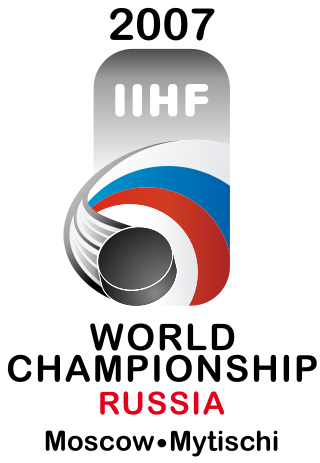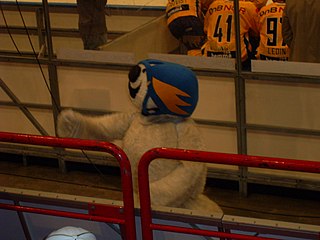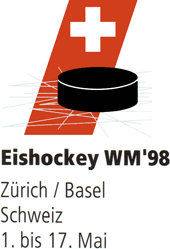The 2002 Men's Ice Hockey World Championships were held between 26 April and 11 May 2002 in Gothenburg, Karlstad and Jönköping, Sweden.

The 2007 IIHF World Championship was held between 27 April and 13 May 2007 in Moscow, Russia. It was the 71st annual world championship event run by the International Ice Hockey Federation (IIHF). The tournament was won by Canada with Rick Nash being named the Most Valuable Player (MVP) of the tournament.
The 1999 Men's Ice Hockey World Championships was the 63rd such event sanctioned by the International Ice Hockey Federation (IIHF). Teams representing 41 countries participated in several levels of competition. The competition also served as qualifications for group placements in the 2000 competition.
The 1998 Men's Ice Hockey World Championships was the 62nd such event sanctioned by the International Ice Hockey Federation (IIHF). Teams representing 40 countries participated in several levels of competition. The competition also served as qualifications for group placements in the 1999 competition.

The 2008 IIHF World Championship was played between May 2 and May 18, 2008 in the Canadian cities of Halifax and Quebec City (Quebec). The two venues were the Halifax Metro Centre and the Colisée Pepsi. The tournament was won by Russia which claimed its first gold medal since 1993.

The 1995 Men's Ice Hockey World Championships was the 59th such event sanctioned by the International Ice Hockey Federation (IIHF). Teams representing 39 countries participated in several levels of competition. The competition also served as qualifications for group placements in the 1996 competition.

The 1997 Men's Ice Hockey World Championships was the 61st such event sanctioned by the International Ice Hockey Federation (IIHF). Teams representing 36 countries participated in several levels of competition, while three other teams competed in an exhibition tournament to gain experience before joining on an official basis in the 1998 competition. The competition also served as qualifications for group placements in the 1998 competition.
The 1996 Men's Ice Hockey World Championships was the 60th such event sanctioned by the International Ice Hockey Federation (IIHF). Teams representing 36 countries participated in several levels of competition, with Slovakia making their first appearance in the top Champions Group A, in their fourth tournament since the dissolution of Czechoslovakia and the formation of the separate Czech Republic and Slovakia men's national ice hockey teams. The competition also served as qualifications for group placements in the 1997 competition.

The 1994 Men's Ice Hockey World Championships was the 58th such event sanctioned by the International Ice Hockey Federation (IIHF). Teams representing 35 countries participated in several levels of competition, with an additional two national teams failing to advance from a mid-season preliminary qualifying tournament. The competition also served as qualifications for group placements in the 1995 competition.
The 1992 Men's Ice Hockey World Championships was the 56th such event sanctioned by the International Ice Hockey Federation (IIHF). Teams representing a record 32 countries participated in several levels of competition. The competition also served as qualifications for group placements in the 1993 competition.

The 1991 Men's Ice Hockey World Championships was the 55th such event sanctioned by the International Ice Hockey Federation (IIHF), and at the same time served as the 66th and last Ice Hockey European Championships. Teams representing 25 countries participated in several levels of competition. The competition also served as qualifications for group placements in the 1992 competition.
The 1990 Men's Ice Hockey World Championships was the 54th such event sanctioned by the International Ice Hockey Federation (IIHF), and at the same time served as the 65th Ice Hockey European Championships. Teams representing 28 countries participated in several levels of competition. The competition also served as qualifications for group placements in the 1991 competition.
The 1975 Ice Hockey World Championships were the 42nd Ice Hockey World Championships and the 53rd European Championships of ice hockey. The tournament took place in West Germany from 3 to 19 April and the games were played in Munich and Düsseldorf. Six teams took part in the main tournament, each playing each other twice. The Soviet Union won all of their games, and became World Champions for the fourteenth time, and won their 17th European title.

The 2009 IIHF World Women's Championships was held in Hämeenlinna, Finland, from April 4 to 12, 2009. This was the 12th women's championship run by the International Ice Hockey Federation (IIHF). The defending champions United States defeated Canada 4–1 in the final match to win the gold medal and retain their top standing another year.

The 1966 Ice Hockey World Championships was the 33rd edition of the Ice Hockey World Championships. The tournament was held in Hala Tivoli, Ljubljana, SR Slovenia, SFR Yugoslavia from 3 to 14 March 1966. For the fourth straight year, the Soviet Union won the tournament. For the Soviets, it was their sixth World and tenth European title. Czechoslovakia beat both Canada and Sweden two to one, to take the Silver, while the Swedes' historic loss to East Germany helped put them fourth behind Canada for the Bronze.

The 2006 IIHF World Championship was held in between 5–21 May 2006 in Riga, Latvia. It was the 70th annual event, and was run by the International Ice Hockey Federation (IIHF).

The 1999 IIHF World Championship was held in Oslo, Hamar and Lillehammer in Norway from 1 to 16 May. It was the top tier of the men's championships for that year.

The 1998 IIHF World Championship was held in Switzerland from 1–17 May 1998. The format expanded to 16 teams for the first time. The teams were divided into four groups of four with the top two teams in each advancing to the next round. The two groups of four then played a round robin with the top two teams in each moving on to the semi-finals. The semi-finals were a two-game total goals for series as was the final.

The 2012 IIHF World Women's Championships was the 14th such event hosted by the International Ice Hockey Federation and took place in Vermont, United States, at the Gutterson Fieldhouse in Burlington, and the Cairns Arena in South Burlington. The competition also served as qualifications for the 2013 competition, and the 2014 Olympics. The Top Division was contested between eight teams from April 7 to April 14, 2012, in Burlington and was hosted by USA Hockey.

The 2023 IIHF World Championship was co-hosted by Tampere, Finland, and Riga, Latvia. The tournament was held from 12 to 28 May 2023, organized by the International Ice Hockey Federation (IIHF).














